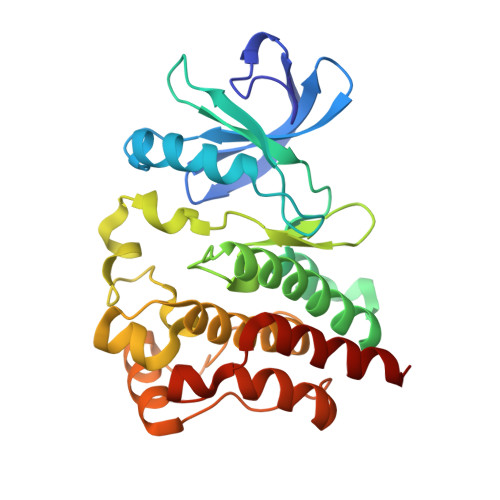NRX-0492 degrades wild-type and C481 mutant BTK and demonstrates in vivo activity in CLL patient-derived xenografts.
Zhang, D., Harris, H.M., Chen, J., Judy, J., James, G., Kelly, A., McIntosh, J., Tenn-McClellan, A., Ambing, E., Tan, Y.S., Lu, H., Gajewski, S., Clifton, M.C., Yung, S., Robbins, D.W., Pirooznia, M., Skanland, S.S., Gaglione, E., Mhibik, M., Underbayev, C., Ahn, I.E., Sun, C., Herman, S.E.M., Noviski, M., Wiestner, A.(2023) Blood 141: 1584-1596
- PubMed: 36375120
- DOI: https://doi.org/10.1182/blood.2022016934
- Primary Citation of Related Structures:
8EJB - PubMed Abstract:
Bruton tyrosine kinase (BTK) is essential for B-cell receptor (BCR) signaling, a driver of chronic lymphocytic leukemia (CLL). Covalent inhibitors bind C481 in the active site of BTK and have become a preferred CLL therapy. Disease progression on covalent BTK inhibitors is commonly associated with C481 mutations. Here, we investigated a targeted protein degrader, NRX-0492, that links a noncovalent BTK-binding domain to cereblon, an adaptor protein of the E3 ubiquitin ligase complex. NRX-0492 selectively catalyzes ubiquitylation and proteasomal degradation of BTK. In primary CLL cells, NRX-0492 induced rapid and sustained degradation of both wild-type and C481 mutant BTK at half maximal degradation concentration (DC50) of ¡Ü0.2 nM and DC90 of ¡Ü0.5 nM, respectively. Sustained degrader activity was maintained for at least 24 hours after washout and was equally observed in high-risk (deletion 17p) and standard-risk (deletion 13q only) CLL subtypes. In in?vitro testing against treatment-na?ve CLL samples, NRX-0492 was as effective as ibrutinib at inhibiting BCR-mediated signaling, transcriptional programs, and chemokine secretion. In patient-derived xenografts, orally administered NRX-0492 induced BTK degradation and inhibited activation and proliferation of CLL cells in blood and spleen and remained efficacious against primary C481S mutant CLL cells collected from a patient progressing on ibrutinib. Oral bioavailability, >90% degradation of BTK at subnanomolar concentrations, and sustained pharmacodynamic effects after drug clearance make this class of targeted protein degraders uniquely suitable for clinical translation, in particular as a strategy to overcome BTK inhibitor resistance. Clinical studies testing this approach have been initiated (NCT04830137, NCT05131022).
Organizational Affiliation:
Laboratory of Lymphoid Malignancies, Hematology Branch, National Heart, Lung, and Blood Institute, National Institutes of Health, Bethesda, MD.


















